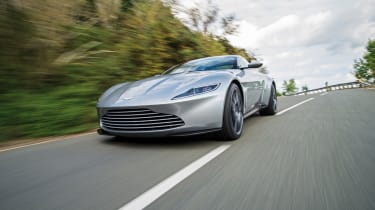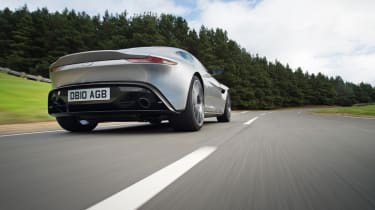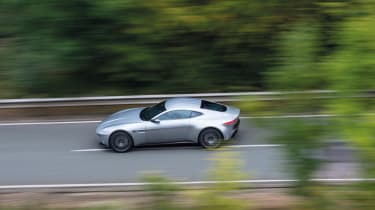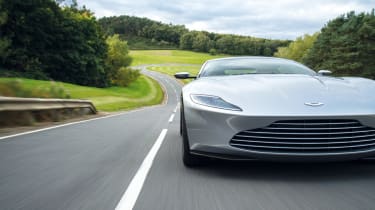Aston Martin DB10 review - Watch us drive James Bond's Spectre car - Page 2 - Driving the Aston Martin DB10
Updated with video. Aston's new Bond car offers an insight into the its future models. We drive one of ten
Starting the DB10 involves leaning over into the passenger footwell, grabbing a big black control box that’s attached to a wiring loom, pulling up a red power switch, and flicking one ignition toggle and then another to trigger the starter motor. As ever, the Aston V8 sounds mighty, a lovely mix of V8 bass and motorsport blare. The gearlever looks more like an automatic selector – a wide oblong with an enamel Aston badge. On its ‘stick’ section there’s another delta-wing switch (pointing down this time) that would rock left to disengage traction control, right to engage radar cruise control and downwards to select reverse. If it moved at all. Here it’s just for effect.
Millbrook’s Hill Route is a hell of a workout for any car. If you don’t know the lie of the land, its combination of blind curves, odd cambers and monster compressions is terrifying, but once you start to learn whether it’s about to turn left or right, it’s just brilliant. Still mildly terrifying, but so bloody exciting you want to circulate it over and over again. I love it, but I’m not sure that the DB10 will share my positivity. This place is any prototype or concept car’s worst nightmare. Even a fully sorted production car will often graze its front splitter, smack into its bumpstops or just wobble and wilt under the stress of the direction changes at maximum attack on this course, so my expectations for the DB10 are lower than the profile of its 20-inch rear tyres.
Sure enough, it immediately feels a little rough around the edges. Aston Martin has its own hospitality unit at Millbrook and driving away from it you have to traverse a steep gravel ramp and then a long stretch of nasty concrete surface before arriving at the foot of the Hill Route. The suspension clatters, the rear axle seems a bit clonky and the whole car is alight with noise and vibration. There’s no sound-deadening to speak of, no airbags, and the floor carpet sits on the bare aluminium structure, so there’s a sense of rawness about the DB10. I think that’s forgivable and a lower kerb weight than the Vantage S (1542kg versus 1610kg) is a useful benefit, too.
More reviews
Things smooth out with speed and the DB10 starts to confound my expectations. Sure, there’s the odd skrrrrrssschh as wheels kiss wheelarch liners and I wince with every big compression, but for the most part it feels superb. The drivetrain really needs revs and the steep gradients here expose a lack of torque, but the flipside is superb traction and the encouragement to crest the wave of top-end power. Do so and the DB10 feels fast, alert and genuinely poised. If anything, it feels a shade too composed – the longer wheelbase and wider track giving a huge amount of grip and dialling out some of the V8 Vantage’s adjustability. Or more accurately, pushing the limits out to such an extent that the adjustability is harder to access and that zone where grip and slip meld is less fuzzy and tolerant, more sharply defined.
Pretty quickly I realise that whilst the exterior and interior styling of the DB10 is a glimpse at what the future holds for Aston Martin, the driving dynamics are a reminder of what must not be lost as it rushes headlong into an exciting new era. I might not find the gearshifter very pleasing to hold but the very act of changing gear manually is fantastically rewarding. The steering – hydraulically assisted – writhes with feedback, the carbon-ceramic brakes are also perfectly judged, and the car has a real sense of authenticity. Everything it does feels natural, intuitive, and that’s because your hands and senses know what’s coming with forensic detail. You are at the centre of the experience, hardwired in and working in unison with every element of the chassis and drivetrain.
In truth, cars such as the Porsche 911 and AMG GT S outperform this car, and the V8 Vantage S to which it owes so much, pretty easily: more power, more torque, more grip, faster gearshifts. In every measurable sense they’re operating at a higher level. They will be the new target. It’s inevitable that the new breed of Aston Martins will become faster and more capable, but retaining their unique character will be the real challenge. How does the attacking driving style that so suits this car live on when you’re running with an extra 100lb ft or more going to the rear wheels and at 1500rpm rather than 5000rpm? How do you get the same sense of intense involvement without a manual lever to operate? The DB10 says to me that the next Astons will looks effortlessly stylish, maybe more exciting and aggressive, and there’s no question that they’ll feel genuinely special in every detail. But for us the magic is in the dynamics as well as the aesthetics. We must wait and hope that numbers and lap times aren’t put ahead of the simple joy of driving.
Such are the demands of photography that the DB10 gets little rest all day. It’s never unravelled by the Hill Route, although certain sections require caution so as not to rub the tyres on the ’arches too severely. The only technical issues are that we run out of fuel at one point (that lovely chronograph gauge doesn’t actually work) and that it gets bloody hot inside (fixed windows and no ventilation). I’m not sure it makes me feel as cool and deadly as James Bond, but it’s a joy to get to drive it so extensively and relatively hard. Going sideways in a precious carbonfibre Aston can definitely be described as ‘a very good day out’.
There’s another DB10 that I really want to drive, though. I enjoyed the shiny, perfectly finished ‘hero car’, but the stunt version has a roll-cage and a hydraulic handbrake. Screw the weight penalty, I’ll take it. Even if the price means sitting through endless Bond films and paying attention. L






